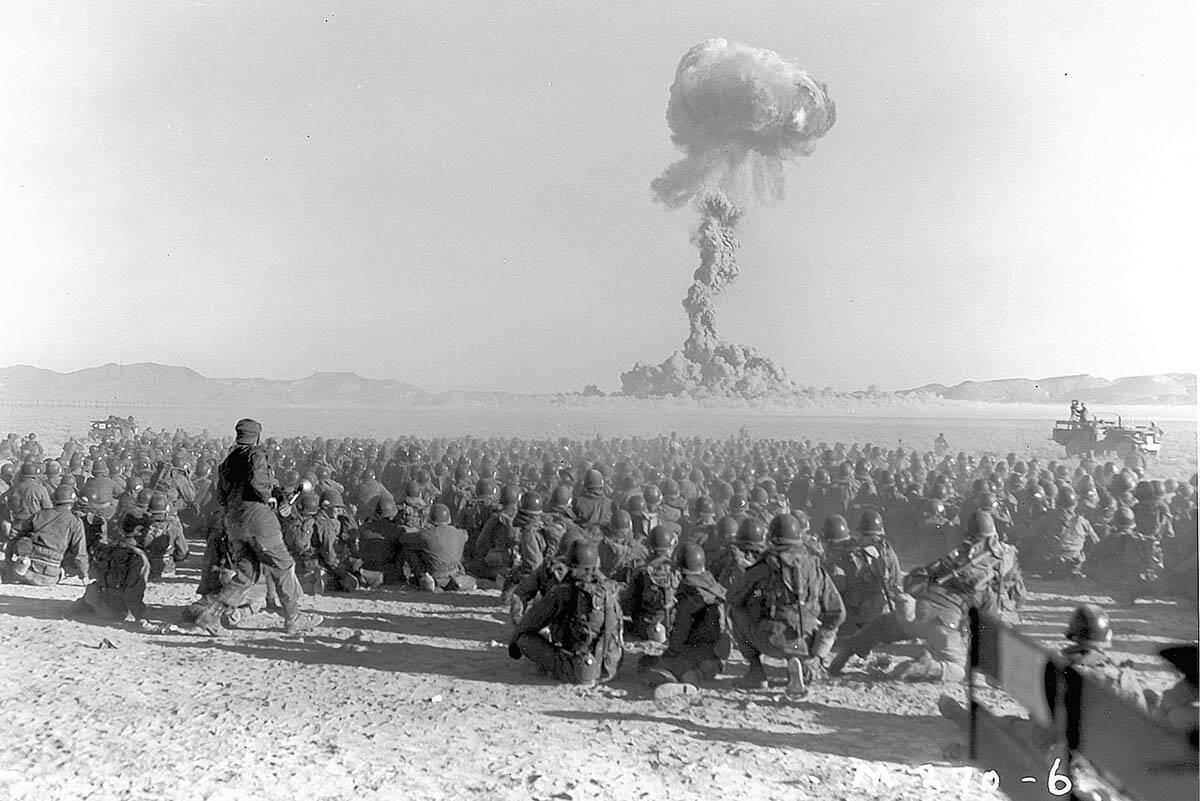NEVADA VIEWS: Justice for downwinders
Between 1951 and 1963, when an international treaty banning above-ground nuclear tests was signed, 100 atmospheric nuclear tests were conducted at the Nevada Test Site, about 65 miles northwest of Las Vegas. While the United States declared its testing program successful in preventing World War III, the people living in the path of the fallout from those tests paid a terrible price.
My family moved to Las Vegas in 1955 and enjoyed an unobstructed view of the atomic blasts from our front yard. A brilliant flash lit up the predawn sky, followed by a mushroom cloud rising up from the desert floor. Like most Southern Nevadans, we were proud to be on the front lines of the Cold War, testing ever-more potent nuclear weapons to deter Soviet aggression. The U.S. government assured us again and again that fallout from the tests was minimal and posed no health risk. We believed what we were told, we drank the Kool-Aid. We also drank the milk from nearby dairies whose cows grazed on irradiated land and produced contaminated milk.
Then people started getting sick. Cancer rates in Southern Nevada and nearby St. George, Utah, were on the rise, as were other health conditions. At age 9, I developed an autoimmune disorder that affected my kidneys throughout adolescence and early adulthood, nearly taking my life on two occasions. It never occurred to the doctors that the exposure to radiation might have played a role. Years later, my father found blood in his urine; six months later, he was dead of bladder cancer.
By then, the federal government had adopted the position that it could not be held responsible for people getting sick and dying, claiming that you couldn’t prove that this case of leukemia or that autoimmune disease was caused by radiation exposure. This argument was successfully employed by the government in a lawsuit filed by the families of four test workers who were exposed to a radiation leak and within two years had all died of leukemia.
In the face of this miscarriage of justice — and to prevent future lawsuits — Congress passed the Radiation Exposure Compensation Act in 1990. Under this statute, the “downwinders” — people exposed to fallout during the above-ground testing — could apply for compensation if they became ill with certain types of cancers or lost family members to those conditions.
Having learned about the legislation only a few years ago, I filed an application. It was not easy, tracking down original documents from 50 years ago. But I persevered, checking every box save one: We had lived in Clark County, most of which was not covered by the act. The Justice Department rejected my application.
The notion that radiation reached the Clark County border and went around the outskirts seems utterly absurd. On a map of counties covered by the legislation, Clark County is a white rectangle surrounded by covered areas, marked by swaths of yellow and green. In retrospect, this seems like a callous attempt by the government to reduce costs by excluding the majority of Las Vegas residents from eligibility.
Nearly all the African American population, who then lived on the Westside and lacked access to quality health care, undoubtedly suffered a disproportionate rate of illness and deaths because of radiation exposure. But if they sought redress under the act, most would have been denied — the map excluded them.
In March, the Senate passed an amendment to extend coverage to Clark County, with the Navajo Nation in New Mexico and other affected populations across the country. This bill, which had widespread bipartisan support, was sent to the House, where it languished for three months. Its opponents, led by Speaker Mike Johnson, are concerned about the cost. They think it’s too broad, and they claim there is insufficient data to justify compensating all the potential claimants.
The National Cancer Institute begs to differ, having linked as many as 212,000 cases of thyroid cancer across the country to exposure to radioactive fallout from the nuclear tests in Nevada. If you want statistics but with a human face, talk to Dr. Laura Shaw, principal investigator for the Radiation Exposure Screening and Education Program and the Nevada Test Site Screening Program. “Many of the patients we see are very ill and have personal and extensive family histories of cancer,” Dr. Shaw said. “Just last week, we screened a mom, daughter and aunt, all with cancer. It’s heartbreaking to hear these stories, and we want to help in any way we can.”
Surely Congress would demonstrate similar concerns for the welfare of the citizens who elected it. Yet the Republican leadership in the House let the clock run out, and the original RECA bill expired June 7.
But there is still time to do the right thing. On behalf of my fellow Nevada downwinders, members of Navajo Nation and all the other individuals and groups who suffered illness and loss as a direct result of the nuclear testing program, I implore Speaker Johnson to bring the Senate’s expansion bill to the floor before Congress adjourns for the summer. Give the people’s representatives a chance to bring a measure of justice to the downwinders and others who even today are fighting desperate battles for their lives and the lives of their loved ones.
Linda Chase grew up in Las Vegas and currently lives in California.

















